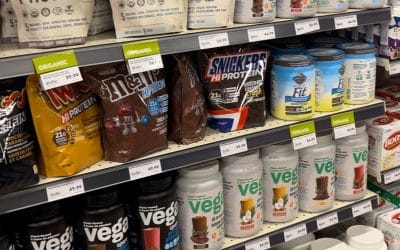With greater exercise volume and intensity, comes greater nutritional responsibility!
The timing, type and quality of post-exercise nutrition has a significant impact on training adaptations and overall recovery. Recovery nutrition post-exercise is important for replenishing muscle glycogen stores, resynthesizing muscle protein, supporting a strong immune system and ensuring adequate rehydration.

You may be familiar with the three R’s of recovery?
- Resynthesize muscle protein: Consuming protein is essential to repair damaged muscle tissue following exercise. Protein is also essential for the growth and maintenance of red blood cells, enzymes, and immune system cells.
- Replenish muscle glycogen: Glycogen is the storage form of carbohydrates and is found in the liver and muscle tissue. It functions as the body’s primary source of energy for high intensity exercise and a significant source of fuel for prolonged exercise. Glycogen stores become depleted with exercise and consuming carbohydrate post-exercise will help to replenish these reserves.
- Rehydrate fluids and electrolytes: Fluid and electrolytes must be replaced to ensure normal thermogenesis, adequate rehydration and nutrient transportation.
Unfortunately, elite athletes do not have the luxury of taking “days off” when it comes to nutrition, as each meal and snack is important for fuelling the next exercise session. The food consumed approximately 48 hours before a race or training session is what is going to fuel that next event. The closer to competition, the higher the emphasis should be on quality nutrition and nutrient intake timing.
Protein
Exercise essentially tears apart your muscle fibers, leaving you fatigued and sore. Protein consumption post-exercise is very important for both increasing protein synthesis and decreasing protein breakdown. Protein is what repairs these tissues and makes them stronger over time to withstand the next period of exercise-induced stress.
Approximately 20-30g of protein can be absorbed and synthesized at once. Therefore, it is important to consume protein in smaller portions, more frequently throughout the day (every 2-3 hours). Excess protein consumed in one serving will either be used for energy or stored as fat in the body.
Aim to include a variety of plant-based and animal-based protein sources in your diet. All animal-based proteins are complete proteins, meaning they contain the 9 essential amino acids (our bodies can’t synthesize themselves). Quinoa, soy, buckwheat, hemp, chia seeds, tempeh and amaranth are plant-based complete proteins however, these foods contain relatively small amounts of protein per typical serving size consumed. If you follow a diet that excludes animal-based protein, make sure to eat a variety and larger quantity of plant-based sources to ensure you are consuming all the essential amino acids and adequate amounts of protein (for example: tofu, tempeh, soy milk, beans, lentils, nut butters, quinoa etc.).
Carbohydrates
Simple carbohydrates are types of carbohydrates that are very low in fiber and are easily digestible and available for fuel in the body. Simple carbohydrates (for example: sports drinks and/or gels, white bagel with honey, carb drink mixes) should be consumed during events longer than 60 mins as glycogen stores will only sustain exercise up to 60-90 mins depending on the exercise intensity. The higher the exercise intensity, the faster the glycogen stores will be depleted.
Easily digestible carbohydrates, along with protein, should also be consumed after exercise. Consuming these together after exercise has been seen to enhance both glycogen and protein synthesis more effectively than only having one or the other. With short recovery windows (<6 hours), in situations such as sports tournaments, back to back races, or multiple training sessions in one day, consume simple carbohydrate-rich foods or liquid immediately post-exercise (<30 mins) that are easily digested and absorbed into the blood. Forgetting to eat after exercise can in fact lead to a decrease in muscle glycogen resynthesis up to 50%!
On the other hand, longer recovery periods (12-24 hours) do not require such urgent post-exercise fuel. Recovery is not likely to be affected as long as you eat a follow up balanced meal (including protein and sufficient carbohydrates) within the next 2 hours following exercise. Muscle glycogen resynthesis is greatest during the initial 60 mins after exercise however, it can take anywhere from 24-48 hours to fully replenish glycogen stores. There are many factors which contribute to the amount of carbohydrate needed post-exercise, such as your body weight and the intensity and duration of the session.
Fats
Fats are very energy dense and are important for helping keep us feeling full and satisfied. However, consuming them immediately before exercise and after the first hour post-exercise is not recommended as fat slows digestion and absorption of other nutrients. During periods of high training loads or growth phases, including higher amounts of fat in your diet can help ensure you are meeting your high energy needs. Aim for sources of unsaturated fats and fats high in omega-3s (ground flax seeds, fatty fish, nuts and seeds, and plant-based oils) to help reduce inflammation and maintain good health.
A few reminders before you go:
- Choose easily digestible carbohydrates and protein to have after exercise.
- Immediate recovery nutrition becomes even more important with a shorter recovery times (multiple training sessions or races in the same day).
- Consume protein in smaller amounts (20-30g) more frequently throughout the day.
- Be prepared and plan ahead! Remember to always eat after a training session, even if you are not hungry!




